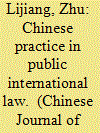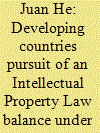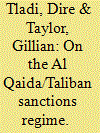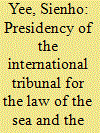| Srl | Item |
| 1 |
ID:
109205


|
|
|
|
|
| Publication |
2011.
|
| Summary/Abstract |
This part supplemented materials reflecting Chinese practice in 2010 relating to: I. International Law of the Sea (Responsibility and Obligations of States Sponsoring Persons and Entities with Respect to Activities in the International Seabed Area; Arctic Cooperation); II. International Law on Outer Space (Peaceful Use of Outer Space); III. International Criminal Law (Crime of Aggression); IV. International Environmental Law (Climate Change).
|
|
|
|
|
|
|
|
|
|
|
|
|
|
|
|
| 2 |
ID:
109201


|
|
|
|
|
| Publication |
2011.
|
| Summary/Abstract |
Compliance mechanisms in multilateral environmental agreements (MEAs) have slowly but certainly replaced the classic dispute settlement procedures as the preferred means to ensure compliance with environmental obligations in public international law and their importance is growing. These mechanisms and procedures apply uniquely to the treaties that created them. At the same time, they show remarkable overlap and similarities. This article looks into the practice of 22 MEAs and compares the compliance mechanisms, procedures and practices found in these international agreements to the classic dispute settlement procedures. Based on this analysis, conclusions are drawn on the necessity and effectiveness of these compliance mechanisms in MEAs.
|
|
|
|
|
|
|
|
|
|
|
|
|
|
|
|
| 3 |
ID:
109202


|
|
|
|
|
| Publication |
2011.
|
| Summary/Abstract |
Progressive and steady technological advancement in developing countries has generated serious debate whether government discretion to manoeuvre IP laws is unduly curbed by the ever-increasing and fragmented international regulatory regime. The global regime has expanded from WIPO conventions to TRIPS at the WTO, and to a myriad of regional and bilateral agreements stipulating TRIPS-plus standards. The way that a harmonized IP fashion operates affects internal decisions in striking a proper balance between incentives to create and those to promote dynamic competition. For developing countries, the ultimate goal is to transform to a knowledge-based and innovative economy. In this regard, the TRIPS "balance" objective is ambiguously formulated and hence cannot be actively considered by WTO panels. Secondly, conditions in the individual exceptions are so restrictively applied that governments are set back from devising innovative exceptions to balance their obligatory commitments. To maximize the use of TRIPS leeway for technological development schemes, both deficiencies need to be managed by a balance-oriented initiative taken by the WTO judicial and/or legislative bodies.
|
|
|
|
|
|
|
|
|
|
|
|
|
|
|
|
| 4 |
ID:
109204


|
|
|
|
|
| Publication |
2011.
|
| Summary/Abstract |
This paper gives an overview of the activities of the International Tribunal for the Law of the Sea in 2010. It provides information on organizational matters, the jurisdiction of the Tribunal and cases before it.
|
|
|
|
|
|
|
|
|
|
|
|
|
|
|
|
| 5 |
ID:
109200


|
|
|
|
|
| Publication |
2011.
|
| Summary/Abstract |
The Al Qaida/Taliban sanctions regime established under Resolution 1267 of the UN Security Council has been under severe strain due to lack of adherence to due process standards. Over the years, the Security Council has incrementally adopted measures to try to alleviate some of the concerns, including through the creation of an ombudsperson to receive petitions from listed individuals requesting to be de-listed. In June 2011, the Security Council adopted two resolutions further strengthening the due process standards. This paper considers whether the new measures adopted are sufficient to respond to some of the concerns raised. While the new initiatives are a significant improvement, as a matter of law, the due process objections remain.
|
|
|
|
|
|
|
|
|
|
|
|
|
|
|
|
| 6 |
ID:
109199


|
|
|
|
|
| Publication |
2011.
|
| Summary/Abstract |
The functions of the President of the International Tribunal for the Law (ITLOS) of the Sea are three-dimensional: the President is a normal international judge, an organizational leader and a judicial leader in a particular case. The Presidency is a powerful one, perhaps more so than that in other international judicial bodies, and can be a platform for the "national State extension" vice-the President's possible partiality towards his or her national State-to take effect. Several antidotes or safeguards exist to combat this, including the relatively short term of office, the judicial solemn declaration and the efforts to equalize the parties by ensuring "national representation" on the Bench in a case, and the principle of separation of functions and the disqualification of the national President as President but not as Judge. However, uncertainties remain regarding the timing and scope of the application of the principle of separation of functions and disqualification of the national President. The context of the ITLOS Statute and Rules and the good administration of justice militate in favour of an early trigger point at the time when a particular case is first presented to the Tribunal and the widest scope possible for the application of the principle to cover a situation where the national State of the President is not a party but is in the same interest or substantially in the same interest as a party in a case, including the situation where, though not factually connected, the non-party national State of the President and a party share a legal position that is decisive in the case. Finally, the paper suggests that, as a further antidote, the possibility be considered of requiring a presidential solemn declaration (separate from and in addition to the judicial one) or revising the current judicial declaration to encompass presidential functions.
|
|
|
|
|
|
|
|
|
|
|
|
|
|
|
|
| 7 |
ID:
109198


|
|
|
|
|
| Publication |
2011.
|
| Summary/Abstract |
There is no single credible explanation for the diverse patterns of rule conformity observed in the global arena. The subject has been approached from multiple perspectives, some inspired by positivist/scientific paradigms of the rationalist type. Among the latter, attempts to systematically account for the effect of reputational capital have been particularly cogent, incisively expressed and empirically well-supported. Nevertheless, the body of knowledge that has been built up is not devoid of theoretical and methodological gaps, a feature brought into focus by examining relevant developments in the seldom addressed by Western legal scholars, but highly pertinent, China context
|
|
|
|
|
|
|
|
|
|
|
|
|
|
|
|